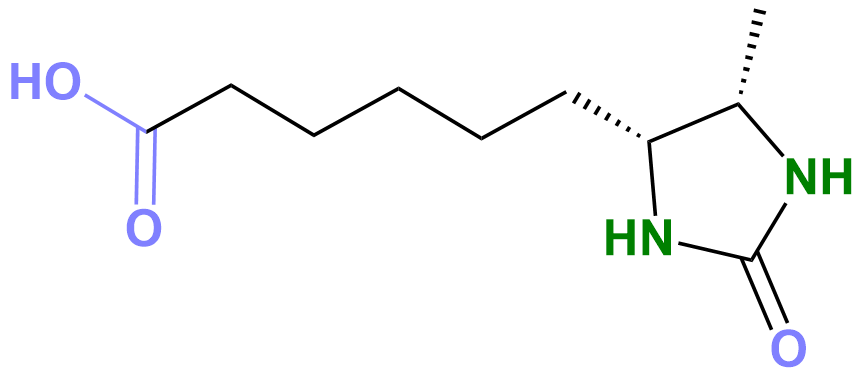Dethiobiotin Analysis Service
- Extensive expertise in handling various biological samples and extracting metabolites.
- State-of-the-art mass spectrometry platforms.
- Strict quality control to ensure reliable results.
- Comprehensive statistical and bioinformatics analysis.
- Personalized service to meet various research needs.
- Animal tissue ≥ 100 mg
- Plant tissue ≥ 200 mg
- Serum/ Plasma ≥ 200 μL
- Urine ≥ 2 mL
Dethiobiotin is a synthetic precursor of biotin, also known as desthiobiotin. Its structural characteristics include a tetrahydroimidazolone ring with a valeric acid side chain bearing a carboxyl group. Its chemical formula is C10H18N2O3, with a molecular weight of approximately 214.26 g/mol. As an intermediate in the biosynthesis pathway of biotin (vitamin B7 or vitamin H), dethiobiotin plays a crucial biochemical role in living organisms. Dethiobiotin is one of the precursors in the synthesis of biotin, and it is converted into biotin in microorganisms and plants through the action of specific enzymes. Biotin serves as a vital coenzyme for various carboxylases in the body, such as propionyl-CoA carboxylase and pyruvate carboxylase, which are involved in key metabolic processes including fatty acid synthesis, amino acid metabolism, and gluconeogenesis. Therefore, analyzing the levels of dethiobiotin helps to understand the dynamic changes in the biotin biosynthesis pathway and to study disease states associated with biotin deficiency.
Quantitative analysis of dethiobiotin and its metabolites helps to elucidate its metabolic processes and conversion pathways in living organisms. This data can further optimize biological and medical research related to biotin synthesis and provide a basis for the diagnosis and treatment of biotin metabolic disorders. High-performance liquid chromatography (HPLC), often coupled with mass spectrometry (LC-MS), is a commonly used method for the quantitative determination of dethiobiotin in biological samples such as plasma and urine. This method offers high sensitivity, specificity, and accuracy, making it particularly suitable for pharmacokinetic studies, therapeutic drug monitoring, and clinical research.

Figure 1. The Structure of Dethiobiotin
MtoZ Biolabs provides a top-tier Dethiobiotin Analysis Service, using our state-of-the-art liquid chromatography-mass spectrometry (LC-MS) platform and our team of skilled metabolomics professionals. We provide a comprehensive analysis of dethiobiotin to meet researchers' needs.
Analysis Workflow
Service Advantages
Applications
1. Identification of new disease biomarkers
2. Improvement of disease diagnosis
3. Expedition of innovative therapeutics discovery
4. Gaining new perspectives on disease mechanisms
Sample Submission Requirements
1. Sample Types
Acceptable samples include serum, plasma, urine, tissues, and other biological specimens. It is required to provide more than 3 specimens under identical conditions for each sample.
2. Sample Volume
3. Sample Preservation
Samples should be stored at -80°C to ensure stability.
Note: Please provide information regarding sample collection and handling.
Deliverables
1. Experimental Procedures
2. Relevant Liquid Chromatography and Mass Spectrometry Parameters
3. Detailed Information on Dethiobiotin
4. Raw Data
5. Custom Analysis Report
Our dethiobiotin analysis service is designed to assist your research and product development endeavors by providing precise and trustworthy results. Trust MtoZ Biolabs for all your metabolomics analysis needs.
How to order?







